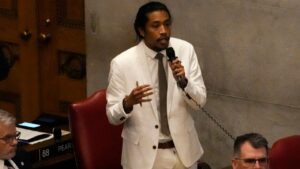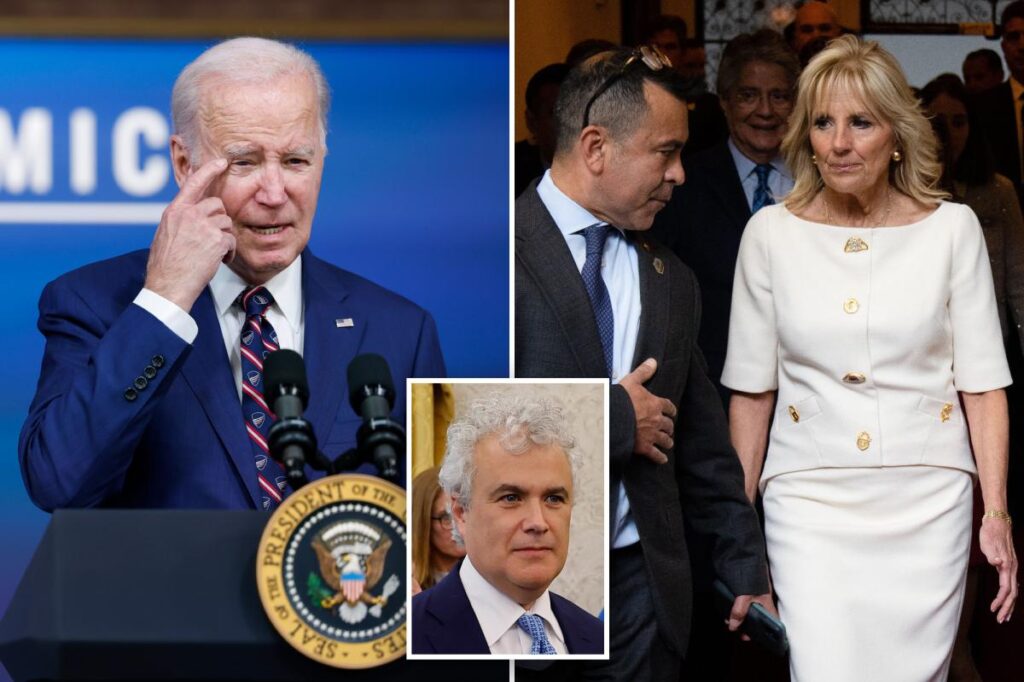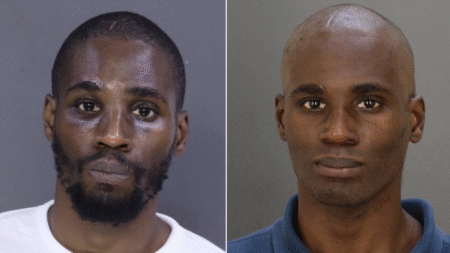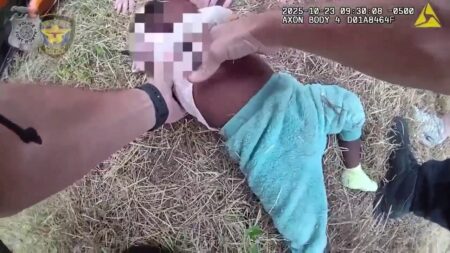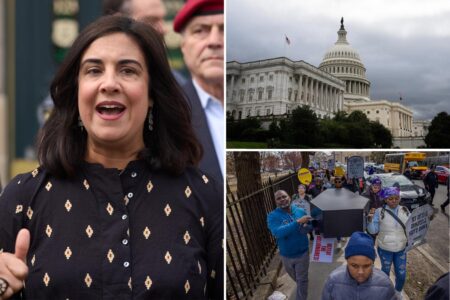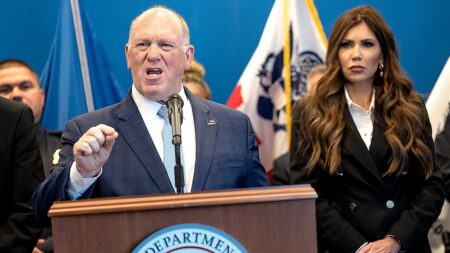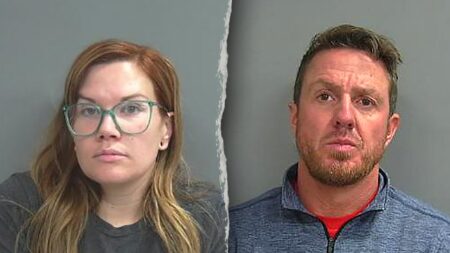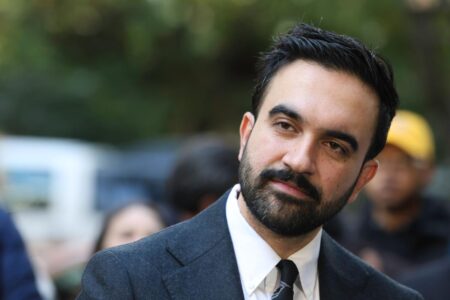WASHINGTON — Dozens of Joe Biden’s executive actions “cannot all be deemed his own” after his closest advisers “went to great lengths to prop up” the 46th president as he suffered physical and cognitive decline in office, according to a bombshell report released Tuesday.
The House Oversight Committee staff document — based on more than a dozen interviews with Biden aides — lays out how the Democrat’s “inner circle” took steps to “meticulously stage-manage” his public appearances, lighten his private workload, and even block lawmakers from talking to him.
“These steps ranged from addressing President Biden’s makeup, clothing, schedule, the number of steps President Biden could walk or climb, the amount of time President Biden needed to read and to spend with his family,” the 91-page report states, “keeping cabinet meetings to a minimum, eliciting ‘direction’ from Hollywood on the State of the Union and other events, and using teleprompters even at small, intimate events.”
In fact, when Biden gave his son Hunter a sweeping pardon from tax and gun felonies — as well as any potential crimes committed over an 11-year period — the president was given a notecard full of approved talking points.
The investigation, run by Oversight Chairman James Comer (R-Ky.), also found that executive orders signed by autopen — including some presidential pardons — should be considered null and void since they were authorized with no “approval traceable to the president’s own consent.”
Biden himself told the New York Times in July that an autopen was used to sign 25 pardon and commutation warrants in December 2024 and January 2025, some of which granted clemency to thousands of offenders. Hunter Biden’s pardon was one of the few the president signed by hand during this period.
Asked directly whether he even knew who operated the autopen, former White House chief of staff Jeff Zients — who approved 11th-hour pardons for first family members on Jan. 19, 2025 — answered bluntly in an transcribed interview with the committee: “I do not.”
“There were good processes in place,” insisted Zients, who acknowledged that he didn’t attend discussions of who would receive last-day pardons from Biden and was only briefed on it by an aide. “[T]here were verbal authorizations of the president’s decision that would occur on occasion.”
Hunter Biden weighed in on some of those “family discussions” of pardons “towards the end, the very end of the administration,” Zients also admitted.
“The authority to grant pardons is not provided to the president’s inner circle. Nor can it be delegated to particular staff when a president’s competency is in question,” the report notes. “Importantly, even if this authority could be delegated — which it cannot — it would have to be expressly delegated by President Biden himself.”
In a June statement, Biden maintained: “Let me be clear: I made the decisions during my presidency. I made the decisions about the pardons, executive orders, legislation, and proclamations. Any suggestion that I didn’t is ridiculous and false.”
The Oversight panel issued a separate letter to Attorney General Pam Bondi Tuesday demanding a full investigation of Biden’s executive actions and clemencies — as well as top aides “deeply involved in the cover-up” who may have committed crimes.
Biden allies accused of having “facilitated” the cover-up include deputy chief of staff Annie Tomasini, White House physician Dr. Kevin O’Connor, and former first lady Jill Biden’s chief of staff, Anthony Bernal.
All three took the Fifth Amendment when hauled before the Oversight panel in recent months.
O’Connor invoked his right against self-incrimination when asked: “Were you ever told to lie about the president’s health?” and “Did you ever believe President Biden was unfit to execute his duties?”
“A key figure in the coverup, Dr. O’Connor propped up the president through grossly misleading medical assessments,” the report assessed of the medical expert who attended to Biden for at least 15 years.
“His refusal to answer questions about the execution of his duties as physician to the president — combined with testimony indicating that Dr. O’Connor may have succumbed to political pressure from the inner circle, influencing his medical decisions and aiding in the cover-up — legitimizes the public’s concerns that Dr. O’Connor was not forthright in carrying out his ultimate duties to the country.”
David Schertler and Mark MacDougall, who represented O’Connor in the deposition, said in a statement at the time that “physician patient privilege and the physician’s ethical duty of confidentiality require that Dr. O’Connor refuse to testify about any aspect of his care and treatment of President Biden,” though other medical professionals like former Obama White House doctor Jeffrey Kuhlman have disputed that doctor-patient privilege would have been violated by the questions posed.
While Trump and Oversight Republicans have stressed that Biden’s autopen-authorized actions should be deemed “void,” DOJ memos have suggested in the past that the president need not hand-sign each act of clemency — the power of which is absolute and has not been curtailed by court rulings or acts of Congress.
Comer added in a statement that the “Biden Autopen Presidency will go down as one of the biggest political scandals in U.S. history.”
Biden was submitted to some neurological work during his annual physicals — but the results were never released to the public and he did not undergo any cognitive tests.
O’Connor would summarize the tests in a brief letter to White House press secretary Karine Jean-Pierre each year, claiming to have ruled out more serious diagnoses like Parkinson’s disease. He never took questions from media.
Notably, Jean-Pierre — who infamously claimed in February 2024 that Biden “passes a cognitive test every day” — refused to answer any questions to the committee about a meeting the president had with a Parkinson’s expert at the White House that January.
Others, like Zients, called for a “full workup” on Biden after his disastrous June 27, 2024, debate against Donald Trump, during which the president stated non-sequiturs — “We finally beat Medicare” — and spoke in a halting, raspy voice that aides attributed to a cold.
“I do recall the communications team brought forward, led by [Biden senior adviser] Anita [Dunn], the question of whether the President should have a cognitive test when he did his physical — which [Dr. O’Connor] had not done, and there had been some coverage around that,” Zients said in a Sept. 18 transcribed interview with the Oversight panel.
“There was discussion of, would doing the test help on this perception [of Biden’s age] issue, would it actually hurt because people would say, ‘Well, that’s a very simple test,’” he added.
Bruce Reed, Biden’s former deputy chief of staff for policy, told the committee that he “heard Doc O’Connor say [cognitive exams] are meaningless.”
“The senior advisers decided that no matter how many tests he took, it would never really quiet the people who were attacking him in an election year on these issues,” Dunn told Oversight staff.
“We did not have any concern about his ability to pass those tests,” she added. “We did not think it would help politically.”
In March 2024, the Biden White House had tried to quell speculation about the president’s physical and mental infirmity by recruiting Hollywood producer Jeffrey Katzenberg and Academy Award-winning director Stephen Spielberg to help him prepare for his State of the Union address, Zients also mentioned.
Special counsel Robert Hur had found the month before that Biden “willfully” kept classified information at his private residence after leaving the Obama White House — but declined to bring federal charges, in part because a jury would view him as a “sympathetic, well-meaning elderly man with a poor memory.”
That was one reason why Biden declined to sit for a traditional Super Bowl interview with CBS News, according to Dunn.
O’Connor, Dunn and senior adviser Mike Donilon were among those who stood to gain financially by keeping him in the 2024 race, according to the Oversight Committee, with Donilon expected to net at least $8 million total if the president won a second term.
Elsewhere, Reed said Biden occasionally exhibited the vigor of a man far younger, including on a return flight from a NATO summit in Brussels, when he joined senior staff in a cabin on Air Force One and aides had to take “turns staying awake to listen to his stories, and he talked the entire way home across the Atlantic.”
But no aides interviewed by Oversight staff were able to corroborate Hunter Biden’s claim that his father’s bungled debate was the result of being put on Ambien sleeping pills — and only Ron Klain, Biden’s first chief of staff in the White House, was willing to admit his performance was poor.
“We’re f–ked,” Klain recalled thinking of his response, when testifying to the Oversight panel. “I certainly knew that we had a big political problem as a result of [the debate].”
“Not one of the Committee’s 14 witnesses was willing to admit that they ever had a concern about President Biden being in cognitive decline,” the report also notes. “In fact, numerous witnesses could not recall having a single conversation about President Biden’s cognitive health with anyone inside or outside of the White House.”
The report concluded: “It is unclear whether these Biden aides were attempting to be deceptively euphemistic about President Biden’s cognitive decline, or whether they had so deceived themselves that they actually believed there to be a meaningful distinction that the American people were simply worried that President Biden was old, not that he was in cognitive decline.”
“This investigation into baseless claims has confirmed what has been clear from the start: President Biden made the decisions of his presidency,” a spokesperson for Biden said in a statement. “There was no conspiracy, no cover-up, and no wrongdoing. Congressional Republicans should stop focusing on political retribution and instead work to end the government shutdown.”
Attorneys for O’Connor, Bernal and Tomasini did not immediately respond to a request for comment. At the time of their depositions, attorney Jonathan Su, who represented Bernal and Tomasini, said: “Any suggestion that such an invocation is itself evidence of wrongdoing would be highly irresponsible and flatly wrong, particularly from those elected to represent the people and uphold the Constitution.”
“There is no actual evidence of wrongdoing by Ms. Tomasini, and President Biden has already confirmed that he made all decisions concerning the grants of clemency at the end of his term,” Su said.
“It is well known that there is an ongoing federal criminal investigation into this matter by the Department of Justice, ordered by the current White House,” Su added in his statement. “This past week, the Chairman suggested that it is ‘very possible’ the investigation could generate criminal referrals to the Department of Justice. Under these circumstances, any reasonable person would seriously consider an invocation of their Fifth Amendment rights.”
Schertler and MacDougall noted the same federal probe in a separate statement when their client took the Fifth: “The totality of the circumstances surrounding this Committee’s investigation leave Dr. O’Connor no choice but to decline to answer questions.”
The Post reached out to reps for the DOJ for comment.
Read the full article here


